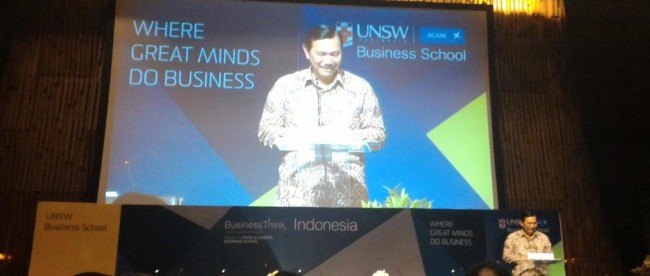Luhut bulldozer or brick wall. Others steady as she goes.
Luhut bulldozer or brick wall. Others steady as she goes. [Posted 28 Nov 2015, 136 views, 7 likes, 2 comments]
On the 26 November 2016, the University of New South Wales (UNSW) held a well attended “Business Think Indonesia” seminar in Jakarta to discuss the business outlook in Indonesia. The guest speaker was Minister Luhut, who welcomes his nick name as “bulldozer” in his present roll to get government programs on track, particularly amongst the slow moving bureaucracy.
Luhut is a retired army general, and well understands that security is the social platform from which business can then develop and support a stable Indonesia. Radicalism is to be countered with reason, while armed groups are to be met with blunt force. Drugs are the number 2 danger to Indonesian society, where a policy of isolating the drug criminals and public education is to continue. The South China Sea issue is to be solved through diplomacy. Factors that are important for Indonesian business to build a better Indonesia include ;
- Appease the masses by presenting them some opportunities and not allowing a few groups to get all the wealth.
- Emphases on business (including FDI) to expand labour intensive work, and for micro to mini business to grow.
- Various infrastructure projects to reduce the logistic costs for Indonesian business, and allow Indonesia to become more competitive within ASEAN etc.
Luhut indicates the government is moving in the right direction, and expects GDP to pick up in the first quarter of 2017. It was a well delivered presentation.
There was a panel of speakers providing a frank outline of their views on Indonesian policy and business. This included Dr Dino Patti Djala, Prof Sofjan Wanandi, Meshuara (Mei) Kanjayaa and Shinta Widjaja Kamandi. Some stand out points included ;-
- A number of statistics for micro, small and medium employment, however real numbers of many business and employment fields are not known.
- Emphases of Indonesia’s lack of competitiveness in ASEAN is the unreliable electricity, poor inter city shipping service, while the new employment wage increase regulation now brings some sense of stability.
- The old stigma that Pro-Business was seen to be contrary to “Pro-Poor” is now changed, wherein private enterprise is now publically recognized as being the principal driver for employment and growth in Indonesia.
- Indonesia welcomes FDI, and encourages more Australia – Indonesian connections in a wide range of areas, including universities, small business etc. A number of difficulties associated with some Indonesian regulations that impede such mutual development, with the work permit / immigration area needing further improvement.
Luhut touched on the Value Added issue on mining, referring to the nickel ore exports and the imagined extra wealth Indonesia will derive from the smelter program. It would seem that under Luhut’s watch, he is not the bulldozer, but a brick wall on this issue. At no point did the seminar address the issue of policy risk, or make a clear call for policy transparency. In the past I have noted that Indonesia had introduced a Value Added policy, wherein the cane (rotan) and clove attempts at value adding resulted in a dismal failure, with sector unemployment and the Indonesian economy moved backwards. My view is that there are indications that parts of the smelter policy are already faltering, and other parts are only moving due to massive government funding. Who knows if tariffs to support Krakatau Steel may need to be extended to the aluminum industry once the smelter is completed – wherein Indonesians will pay more for their metals than their ASEAN competitors.
Much of the seminar and discussion was politically correct, wherein some of the eminent Indonesian speakers only very lightly and indirectly criticized the government – “steady as she goes”.
A set of informal personal notes can be found athttp://ianwollff.com/category/professional-articles/

